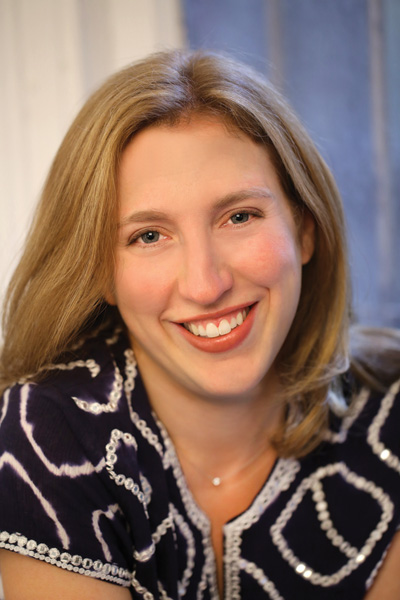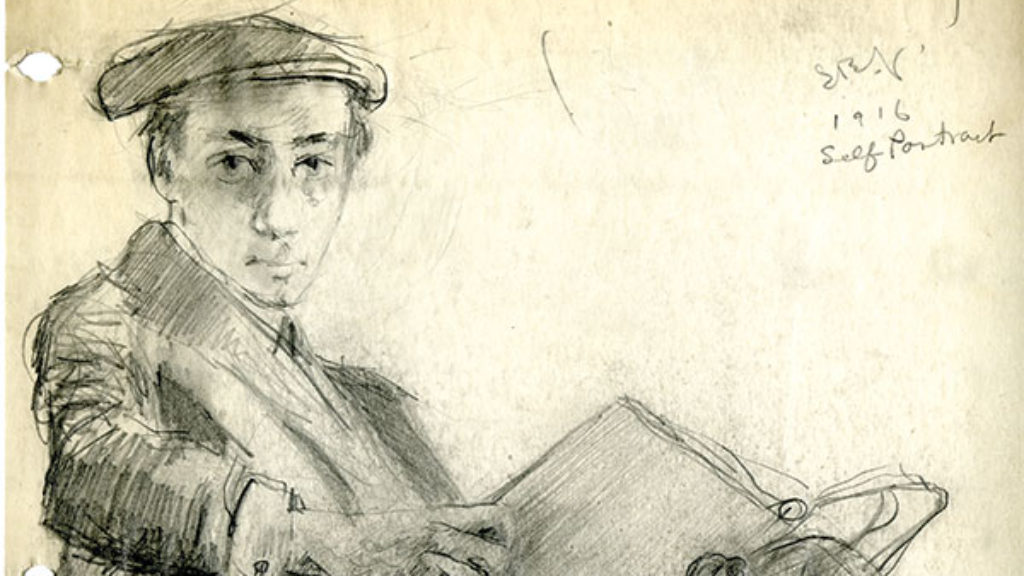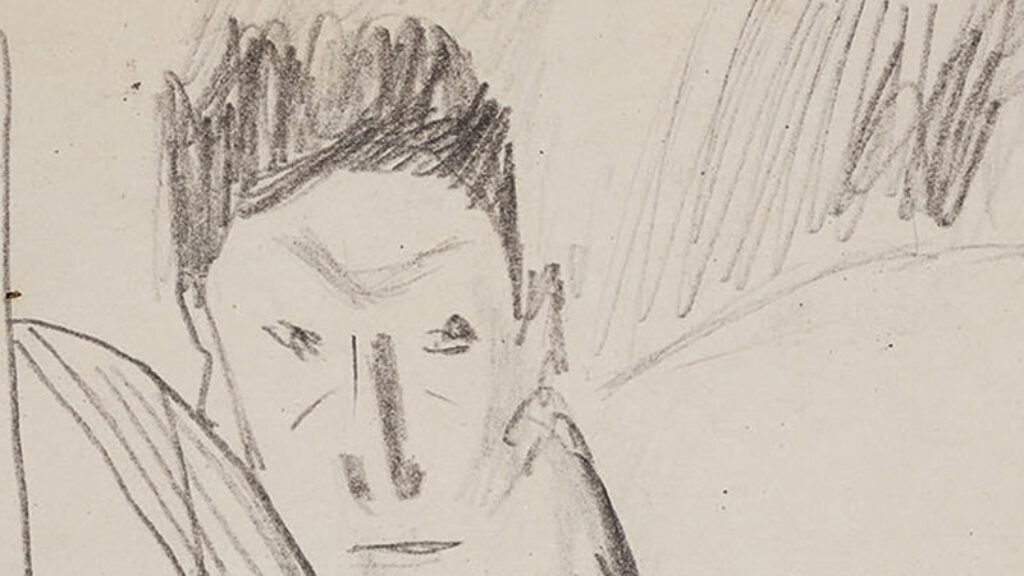Fiction and Forgiveness
Watching on the Web as crowds spilled into the streets of Cairo by the millions lent an unexpected urgency to the experience of reading Dara Horn’s new novel. Whether they were protesting the evisceration of Egypt’s few democratic institutions, defending the theocratic visions of the Muslim Brotherhood, denouncing Zionist plots, or simply giving voice to their tottering nation’s starvation and rage, the waves of humanity crashing each day into Tahrir Square underscored the timeliness of Horn’s A Guide for the Perplexed, which is mostly set in present-day Egypt and contains, along with a great deal else, grim if occasionally hopeful commentary about that country’s weighty history and current crises.

The thirty-six-year-old Horn is one of the most Jewishly ambitious novelists working in America today. In her debut novel, In the Image, she explored issues of faith and theodicy, bridging contemporary American literature, classic modern Yiddish fiction, and the Book of Job. Restless in this world, she attempted in her next novel, The World to Come, to imagine her way into the afterlife via a plot involving Marc Chagall and the Yiddish writer known as Der Nister. Her third novel, All Other Nights, was set during the Civil War and dramatizes the distinctive American Jewish tension between universalism and particularism through the prism of the Passover story.
Horn’s literary energies are generated cumulatively through plot, moral weight, and elegant thematic architectures built from the storehouses of Jewish culture, rather than through the indrawn breath prompted by lapidary individual sentences. (There are exceptions, such as her description of “a summer mountain twilight, thick with the smell of wet wood and encroaching darkness, the twilight fragrance that children imagine to be possibility and adults know to be regret.”) She is first, and foremost, a storyteller, yet these stories carry Horn’s readers higher and further than many of her contemporaries do with dazzling prose.
As its Maimonidean title would indicate, A Guide for the Perplexed offers the same lofty level of Jewish substance and theme as her previous novels. In addition to wrestling with the conundrum of divine providence as presented in Maimonides’ philosophical magnum opus, Horn’s novel also acts as an extended midrash on the biblical Joseph story, telescopes back in time from the 21st century to the 19th and 12th centuries, and explores the themes of memory and forgiveness in the Bible and in our contemporary culture.
At the same time, A Guide for the Perplexed feels somewhat different from Horn’s previous novels. The geographical focus is not the American-Eastern European Jewish axis but the Islamic world, both in medieval times and today. An even more palpable difference is that, despite its heavy freight of cultural allusion, this novel is Horn’s speediest read yet. Maimonidean argument and biblical narrative are central to the book, but its structure is that of a popular thriller, and its three hundred pages fly by even more effortlessly than her previous novels. (This may also be because it is not part of her larger project of trying to solder American Jewish memory more deeply to its Ashkenazi antecedents.)
At the center of the novel’s plot is Josephine Ashkenazi, a computer genius with a touch of Asperger’s Syndrome (never mentioned but perfectly described: “The wave of accuracy surged within her, unstoppable, like nausea”) whose ultimate software design achievement would seem the stuff of science fiction were it not so close to what is happening around us each day. She has created a computer application that so thoroughly records the minutiae of an individual’s existence that no part his or her life need any longer be lost or forgotten, at least from the perspective of a search engine. It is Facebook on steroids, a Google Glass watching the totality of our lives from birth to death.
Marinating hellishly in envy of Josie’s success is her older sister Judith. So eager is Judith to experience a bit of freedom from her brilliant sister’s long shadow, which extends back into a childhood in which Josie was always the family’s favorite, that when the government of Egypt extends Josie a somewhat dodgy invitation to spend several weeks working as a data management consultant for its new, modern library in Alexandria, Judith presses the buttons of Josie’s ego as only a sibling knows how to do.
Josie heads off to Egypt. This is a land whose maladies are depicted in the novel in spiritual as much as historical terms: Egypt as Jewish tradition’s Mitzrayim, the place of human narrowness and constriction of hope (which might, one muses, watching CNN, be as accurate as any geopolitical analysis at this point). There she is kidnapped. Imprisoned, brutalized, and cut off from contact with the outside world, she is soon given up for dead by her family. Judith increasingly insinuates herself into the void left by her accomplished sister, until the novel’s outcome hangs on what sacrifices one sister might make for the sake of the other.
That this is a retelling of the biblical Joseph story is no secret, and Horn’s novel movingly exposes the horror inhabiting that biblical text, the blinding hatred that can exist between siblings. After reading the account of Josie’s imprisonment in Egypt and her abandonment by her family, it will be impossible for me this fall, when I again hear the Torah readings recounting Joseph in the pit and in jail, not to feel more freshly and painfully the trauma Jacob’s son underwent and the act of will and self-mutilation required to endure it. The term “midrash” is thrown around too casually these days, applied to any mediocre poem or novel that happens to have a biblical figure in it. In drawing new depths of meaning and experience from the biblical story, Horn earns the term.
However, with characteristic narrative ambition, Horn also weaves into the novel two other stories, similarly set in Egypt and dealing with relations between siblings. The first is Solomon Schechter’s recovery of the Cairo Geniza in 1896-1897. A geniza is any synagogue storeroom in which worn-out Jewish texts are deposited, but ever since the Cambridge scholar (later head of the Jewish Theological Seminary in New York) carted off to England the contents of the one in the synagogue in old Cairo, it has become the geniza. What Schechter, following clues given him by the Cambridge scholar-travelers and identical twins Margaret Gibson and Agnes Lewis, found was a cultural treasure trove like nothing else in Jewish history.
Miraculously, the Cairo Geniza preserved centuries of texts and documents and letters and poems, including vanished Hebrew originals of ancient apocryphal texts, lost collected works of the literary titans of medieval Spain, and, through financial and legal records, first brilliantly analyzed by historian S.D. Goitein, a socio-economic record of medieval Jewish life in the Mediterranean unparalleled in its richness and detail. Over a century after Schechter’s visionary rescue of the material, historians are still profitably sifting through it.
The second story Horn weaves into the novel is that of the preeminent medieval Jewish philosopher Moses ben Maimon (Maimonides), some of whose own letters and manuscripts were discovered by Schechter in the Cairo Geniza. Horn imagines the relationship between Moses, a Cairo resident seven hundred years before Schechter’s sojourn, and his brother David, who, we learn from a poignant letter, perished at sea in a shipwreck while on a business venture.
Horn deftly weaves together her three narratives—Josie’s, Schechter’s, and Maimonides’—through a series of common motifs and themes: sibling rivalry (and Schechter, like his Cambridge friends Gibson and Lewis, had an identical twin, Israel, who helped found the, for Horn’s purposes, perfectly named Israeli town of Zikhron Yaakov, or “memory of Jacob”); the precarious existence throughout history of Jews in the Muslim world; the destructive lure of fame; the mysteries of providence; even asthma.
The most important of these thematic strands is memory, our relationship to the past, as it is embodied in the Cairo Geniza as well as its astronomically larger, present-day avatar in the internet. Josie’s computer application is in fact named Geniza, and part of her hubris is to believe that the total recall it allows can enable her to capture the essence of a person. Yet the centuries-old chaos of papers, scrolls, and fragments liberated by Schechter directly challenges our confidence that what we now call data, no matter how rich, big, or perfectly recorded, will bring us into the soul of another person. Horn’s novel may also reflect a parent’s awareness that our now endless video records of our children, our social media walls and tumblr chronicles, only asymptotically approach the reality of our children’s selves, and can sometimes even occlude it.
In A Guide for the Perplexed, Horn voices a deep skepticism that any of us, even the careful historian, can be confident of our access to an objective past. As the twins of Cambridge presciently remark to Schechter:
But just consider how much material there will be for historians in the future, now that we have printing presses, and telegraphs, and newspapers, and mail deliveries two or three times a day. For every book and letter we find in this genizah, the genizah of the future will surely have hundreds of thousands. It will be endless. The past will become a bottomless pit.
This does not make the Cambridge ladies despondent. Rather, they cheerfully accept that all reconstructions of the past are creative, as much like the work of Horn the novelist imagining Maimonides’ guilt over his brother’s death as they are like that of Schechter the scholar archiving papyrus fragments. Moreover, they calmly deny that any of these reconstructions can ever arrive at the truth of a life in its entirety. “[P]eople find what they wish to find, and remember what they wish to remember, regardless of the evidence presented to them,” says Margaret to the perplexed Schechter.
One of the novel’s unmentioned presiding spirits is surely the late historian Yosef Hayim Yerushalmi, who, in his celebrated little book Zakhor: Jewish History and Jewish Memory, observed that history and memory, while often conflated, are two different, even opposed things. History, because of its rigorous fidelity to the totality of the recorded past, cannot tell stories about or draw lessons from it. It is memory—willful, partial, and selective—that makes meaning from the past and allows us to find our way in the present. Yerushalmi found his own illustrative model in “Funes el memorioso” (“Funes the Memorious”), a short story by the Argentine writer Jorge Luis Borges, in which a man suffering a head injury is thereafter endowed with the curse of perfect memory. He cannot forget anything. Without the ability to forget, Funes becomes paralyzed, swallowed in the ocean of undifferentiated existence, unable to judge or think.
Horn’s arabesque-like dips into Schechter and Maimonides are cleverly constructed. Yet, despite their thematic force, they feel ornamental (a product of geniza-like coincidence rather than Maimonidean providence—though perhaps that is part of her point), and they are less vividly drawn than, for instance, the Schechter presented in Adina Hoffman and Peter Cole’s recent study Sacred Trash: The Lost and Found World of the Cairo Geniza. “With his bushy, red-tinted beard, unruly hair, and tendency to gesticulate broadly as he spoke,” write Hoffman and Cole, “Schechter had been known to set off in the broiling heat of midsummer wrapped up in a winter coat and several yards of scarf.”
Where Horn’s novel shines most, and most darkly, is in its central plot. For here we encounter the most startling aspect of her novel, her reconfiguration of the family reconciliation that brings the Joseph story to its conclusion. A geniza-like perfect memory, Horn teaches, has no place for forgiveness. It is simply impossible in our world of facts, in a perfectly whole historical record, to forgive another human being, let alone repent one’s own past actions. As Horn’s Maimonides says: “We choose what is worthy of our memory. We should probably be grateful that we can’t remember everything as God does, because if we did, we would find it impossible to forgive anyone.”
Forgiveness, Horn proposes, requires a denial of the past. But she goes a step further, implying that forgiveness may even require the invention of a different past, a rewriting of history. Horn’s Cambridge twins have no problem with this wisdom as applied to the historical record. “We treasure that tiny discovery of a world that was,” they tell Schechter, who worries that his scholarly researches may inadvertently misread or even falsify the past, “Even if it was a world that wasn’t.”
Horn’s tale of Josie and Judith pushes this attitude into the realm of human relations, suggesting a conclusion that is unsettling and perhaps less than consoling. Each act of forgiveness is a fiction.
Comments
You must log in to comment Log In
Suggested Reading
Purity and Obscurity
When contemporary Jews of priestly lineage avoid cemeteries, when ordinary Jews wash their hands before eating, or immerse themselves in ritual baths, they are acting according to the dictates of an ancient system.

Orpheus on the Lower East Side
Hart Crane’s name will forever be linked to Samuel Greenberg’s by a brilliant act of plagiarism, for the story of Greenberg’s posthumous manuscripts is almost as remarkable as the poetry itself.

Graven Images
“How do you like my drawing?” Franz Kafka wrote his fiancée Felice Bauer. He took art seriously, and now, finally, we can answer the question ourselves.
Standing at Sinai in Medieval Germany
An unusual illustration of revelation from the fourteenth century Tripartite Mahzor.
Laura Leibman
So glad you reviewed this--I didn't realize it was out yet. Can't wait to read it. Love, love, love Dara Horn's books.